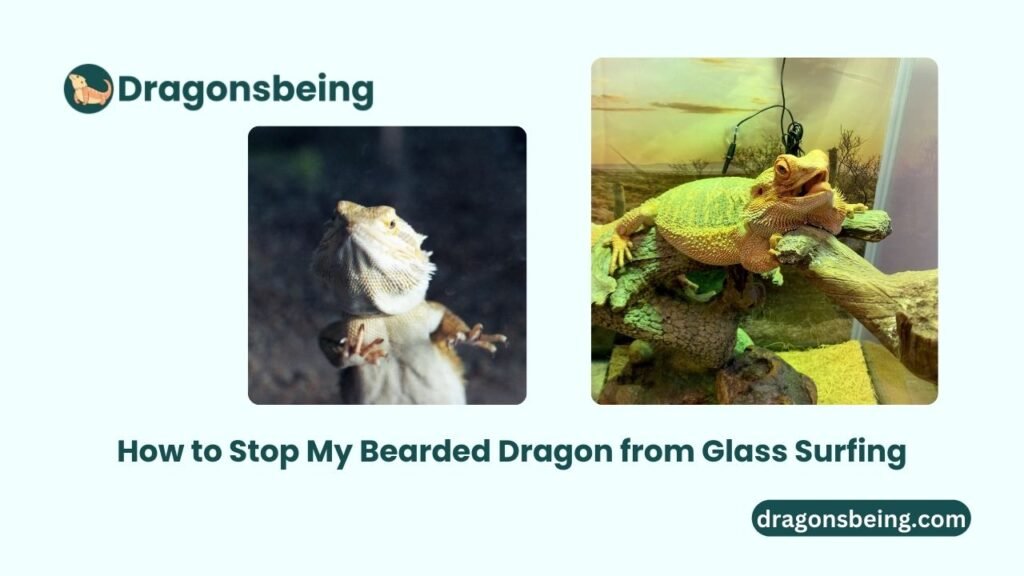To stop your bearded dragon from glass surfing, create a more enriching environment and minimize reflections in their habitat. Providing hiding spots and climbing structures can also reduce this behavior.
Bearded dragons are curious reptiles that often exhibit glass surfing, a behavior where they repeatedly push against the glass of their enclosure. This can indicate stress, boredom, or a desire for more space. Understanding why your bearded dragon engages in this behavior is crucial for its well-being.
Creating a stimulating habitat helps reduce anxiety and encourages natural behaviors. Incorporating elements like branches, rocks, and plants can provide both physical and mental enrichment. Adjusting the lighting and reducing reflective surfaces also plays a significant role in curbing this unwanted activity. A well-structured environment leads to a happier, healthier bearded dragon.
Introduction To Glass Surfing In Bearded Dragons
Glass surfing is a common behavior in bearded dragons. It occurs when they repeatedly run into the glass of their enclosure. This behavior can be concerning for pet owners. Understanding it is vital for their well-being.
Identifying Glass Surfing Behavior
Glass surfing looks like frantic movement against the tank walls. Signs include:
- Running back and forth
- Scratching at the glass
- Head bobbing
- Jumping or climbing on the glass
These actions indicate stress or frustration. Observing your bearded dragon’s behavior is essential. If it spends more time glass surfing than basking, it’s a sign of an issue.
Reasons Behind Glass Surfing
Understanding why bearded dragons glass surf helps address it. Common reasons include:
| Reason | Description |
|---|---|
| Stress | Changes in environment can cause anxiety. |
| Boredom | Not enough stimulation leads to restless behavior. |
| Territorial Instincts | Seeing reflections may trigger protective instincts. |
| Temperature Issues | Improper basking spots can create discomfort. |
Each of these reasons affects their behavior. Addressing these factors improves their happiness. A happy bearded dragon is less likely to glass surf.
The Impact Of Glass Surfing On Health
Glass surfing can harm your bearded dragon’s health. This behavior indicates stress and frustration. Understanding the effects is crucial for their well-being.
Physical Risks
Glass surfing poses several physical risks for bearded dragons. Here are some key concerns:
- Injury: Repeatedly bumping into glass can cause injuries.
- Dehydration: Stress can lead to decreased water intake.
- Obesity: Stressful situations can reduce activity levels.
- Digestive Issues: Stress affects their appetite and digestion.
Stress Indicators
Bearded dragons show signs of stress through various behaviors:
- Glass Surfing: Scratching and trying to escape.
- Hiding: Seeking shelter more often.
- Loss of Appetite: Eating less than usual.
- Color Changes: Skin may darken or pale.
Recognizing these signs helps you act quickly. Reducing stress improves their overall health.
Assessing Your Bearded Dragon’s Environment
Understanding your bearded dragon’s environment is crucial. A comfortable space can reduce glass surfing behavior. Focus on tank size, temperature, and lighting. These factors impact your dragon’s well-being.
Tank Size And Space
The size of your bearded dragon’s tank matters greatly. A cramped space can lead to stress. Ensure your tank is appropriate for your dragon’s size. Here are the recommended tank sizes:
| Age | Tank Size |
|---|---|
| Hatchling | 20 gallons |
| Juvenile | 40 gallons |
| Adult | 75 gallons |
Provide hiding spots and climbing areas. Use rocks and branches for enrichment. A spacious tank reduces anxiety. Regularly clean the tank to keep it inviting.
Optimal Temperature And Lighting
Temperature and lighting directly affect your bearded dragon’s health. Proper heat encourages natural behaviors. Use a reliable thermometer to monitor temperatures.
- Daytime Temperature: 95-105°F (35-40°C) in the basking area
- Cool Side Temperature: 75-85°F (24-29°C)
- Night Temperature: 65-75°F (18-24°C)
Use UVB lighting for at least 12 hours daily. This helps with calcium absorption. Replace bulbs every 6-12 months for effectiveness. Proper lighting keeps your dragon active.
Adjust the environment based on your dragon’s behavior. A well-maintained habitat can reduce glass surfing. Happy dragons are less likely to exhibit this behavior.
Enrichment Strategies To Prevent Boredom
Boredom can lead to glass surfing in bearded dragons. Enrichment strategies keep them engaged. These strategies include introducing new objects and changing the habitat layout.
Introducing New Objects
New objects can spark curiosity. Use safe materials for your dragon. Consider these options:
- Branches and logs
- Hiding spots like caves
- Natural plants (safe for reptiles)
- Toys specifically made for reptiles
Change these objects regularly. This keeps the environment exciting. Watch how your dragon interacts with them. This will help reduce glass surfing.
Changing The Habitat Layout
Changing the habitat layout stimulates your bearded dragon. A fresh setup creates new exploration opportunities. Try these tips:
- Rearrange furniture and decorations.
- Create different levels with platforms.
- Move the basking spot.
- Adjust the placement of food and water dishes.
Regular changes prevent boredom. Your dragon will love exploring its new space. Observe its behavior for signs of happiness.
Dietary Adjustments For A Happier Dragon
Diet plays a crucial role in your bearded dragon’s happiness. Proper nutrition can reduce stress and prevent glass surfing. Make sure to adjust their diet for optimal health.
Balanced Nutrition
A well-rounded diet is essential. Bearded dragons need a mix of:
- Insects: Crickets, mealworms, and dubia roaches.
- Vegetables: Collard greens, mustard greens, and bell peppers.
- Fruits: Strawberries, blueberries, and mango.
Provide a variety of foods. This keeps your dragon interested. Use the following table for a balanced diet:
| Food Type | Percentage of Diet |
|---|---|
| Insects | 30-50% |
| Vegetables | 40-60% |
| Fruits | 5-10% |
Feeding Schedule
Establish a regular feeding schedule. This helps your dragon feel secure. Consider these guidelines:
- Feed juveniles daily.
- Feed adults every other day.
- Provide fresh vegetables daily.
- Offer insects 2-3 times a week.
Keep a consistent routine. This reduces stress. Monitor your bearded dragon’s behavior closely. Happy dragons don’t glass surf!
Creating A More Natural Habitat
Creating a natural habitat is essential for your bearded dragon. A suitable environment reduces stress and keeps them happy. Glass surfing often indicates boredom or discomfort. Enhancing their habitat can help eliminate this behavior.
Incorporating Live Plants
Live plants make a habitat feel more natural. They provide shade and hiding spots. Choose safe, non-toxic plants for your bearded dragon. Here are some great options:
- Spider Plant – Easy to care for and safe.
- Pothos – Beautiful vines that thrive indoors.
- Ficus – Great for climbing and hiding.
- Hibiscus – Adds color and is safe.
Ensure plants receive proper light. Position them away from direct heat. This keeps your bearded dragon comfortable.
Using Natural Substrates
Natural substrates mimic the bearded dragon’s wild environment. They encourage digging and exploration. Consider these substrate options:
| Type | Description | Benefits |
|---|---|---|
| Reptile Carpet | Soft and easy to clean. | Safe and comfortable. |
| Sand | Fine and natural. | Encourages digging. |
| Organic Soil | Safe and natural. | Promotes plant growth. |
Avoid using loose substrates like gravel. They can cause impaction. Choose options that are safe and easy to maintain.
Social Interaction And Bonding
Social interaction is vital for your bearded dragon’s health. Glass surfing often signals boredom or stress. Building a bond helps reduce these behaviors.
Engaging with your pet regularly can enhance their well-being. Let’s explore effective methods to bond and provide social interaction.
Handling And Playtime
Handling your bearded dragon helps them feel secure. Regular playtime also stimulates their mind. Here are some tips for effective handling:
- Always wash your hands before handling.
- Support their body fully to prevent stress.
- Keep sessions short, around 10-15 minutes.
- Use a calm, gentle voice to soothe them.
Playtime can include:
- Providing toys like balls or tunnels.
- Allowing supervised exploration outside the enclosure.
- Engaging in gentle games like hide and seek.
Introducing Other Bearded Dragons
Introducing another bearded dragon can enhance social interaction. However, it requires careful planning. Here’s how to do it safely:
- Ensure both dragons are healthy and similar in size.
- Use separate enclosures for initial introductions.
- Gradually allow them to see each other.
- Monitor interactions closely for signs of aggression.
Benefits of socializing with another bearded dragon include:
| Benefit | Description |
|---|---|
| Reduced Boredom | Companionship keeps them engaged. |
| Improved Social Skills | They learn to interact with their kind. |
| Increased Activity | Playful interactions boost their energy. |
The Role Of Exercise And Activity
Exercise and activity are vital for your bearded dragon’s well-being. They help reduce stress and boredom. Engaging in physical activities can stop glass surfing behavior.
Providing Climbing Structures
Bearded dragons love to climb. Providing climbing structures keeps them active. Here are some great ideas:
- Branches: Use natural wood branches for climbing.
- Rocks: Flat rocks can create interesting surfaces.
- Platforms: Add platforms at different heights.
- Reptile Hammocks: These give a cozy resting place.
Ensure the structures are safe and stable. Avoid sharp edges. Regularly check for wear and tear. This keeps your dragon safe and happy.
Encouraging Exploration
Encouraging exploration helps reduce boredom. Here are ways to promote exploration:
- Varied Enclosure: Change the layout of the habitat regularly.
- Hideouts: Add caves or tunnels for hiding.
- New Items: Introduce new toys or decorations.
- Outdoor Time: Supervised outdoor time can be beneficial.
Exploration provides mental stimulation. It keeps your bearded dragon curious and active. Encourage them to discover their environment.
Monitoring And Adjusting The Environment
Creating a calm space for your bearded dragon is essential. Monitor and adjust their environment regularly. This helps reduce glass surfing behavior.
Regular Checks For Stressors
Identify any stressors in your bearded dragon’s habitat. Common stressors include:
- Excess noise
- Bright lights
- Other pets
- Sudden movements
Perform regular inspections of their enclosure. Look for signs of discomfort. Adjust the environment as needed to ease their stress.
Temperature And Humidity Levels
Proper temperature and humidity are crucial for your pet’s well-being. Check these levels daily:
| Zone | Temperature (°F) | Humidity (%) |
|---|---|---|
| Warm Side | 95-100 | 30-40 |
| Cool Side | 80-85 | 30-40 |
Use a reliable thermometer and hygrometer. Adjust heating elements and mist the enclosure if needed. Maintaining optimal levels helps keep your bearded dragon calm.
When To Consult A Veterinarian
Understanding your bearded dragon’s behavior is crucial. Glass surfing can be normal, but it may signal a problem. Knowing when to seek help is vital for their health.
Persistent Glass Surfing
If your bearded dragon continues glass surfing for days, it’s time to act. This behavior often indicates stress or discomfort. Here are some signs to watch for:
- Duration: Surfing persists for more than three days.
- Frequency: Happens multiple times a day.
- Environment: No changes made to their habitat.
Consider consulting a veterinarian if you notice these signs. Your pet may need a thorough check-up.
Signs Of Illness
Look for any unusual behaviors or physical symptoms. These may include:
| Symptom | Action |
|---|---|
| Loss of appetite | Schedule a vet appointment |
| Weight loss | Monitor and consult a vet |
| Abnormal feces | Collect samples for testing |
| Skin discoloration | Seek immediate veterinary care |
Pay attention to your bearded dragon’s habits. Unusual changes indicate they might be unwell. Acting quickly can prevent serious issues.
Conclusion: Ensuring A Fulfilling Life For Your Bearded Dragon
Creating a happy environment for your bearded dragon is essential. Understanding their behavior helps prevent issues like glass surfing. A well-stimulated dragon leads a healthier life.
Summarizing Key Points
- Provide ample space in the enclosure.
- Include enriching items like hides and climbing structures.
- Maintain proper temperature and humidity levels.
- Ensure a balanced diet with live insects and vegetables.
- Limit stress factors in their environment.
Continued Learning And Care
Staying informed about bearded dragon care is vital. Resources include books, online forums, and expert advice. Join communities to share experiences.
Regular check-ups with a vet ensure your dragon stays healthy. Look for signs of stress or illness. Quick action can prevent serious problems.
| Resource Type | Examples |
|---|---|
| Books | The Bearded Dragon Manual, Bearded Dragons for Dummies |
| Online Forums | Reptile forums, Bearded Dragon Reddit community |
| Expert Advice | Local reptile vet, specialized reptile shops |
Frequently Asked Questions
Why Does My Bearded Dragon Glass Surf?
Bearded dragons often glass surf due to stress, boredom, or a desire for more space.
How Can I Stop Glass Surfing?
Provide enrichment, hide spots, and a larger habitat to reduce glass surfing behaviors.
Is Glass Surfing Harmful To My Dragon?
Yes, it can lead to stress and injuries over time, affecting your dragon’s well-being.
What Habitat Changes Help Stop Glass Surfing?
Increase tank size, add climbing structures, and create hiding places to make the environment more stimulating.
Can I Use Distractions For My Bearded Dragon?
Yes, toys, branches, and interactive feeding can keep your dragon engaged and reduce glass surfing.
Should I Be Worried About My Dragon’s Behavior?
Frequent glass surfing indicates underlying issues; assess their environment and health for potential problems.
Conclusion
To curb glass surfing in your bearded dragon, create a more enriching environment. Provide hiding spots, climbing structures, and interactive toys. Regular handling and socialization can also help. By addressing your dragon’s needs, you promote a happier, healthier pet. Remember, a stimulated bearded dragon is less likely to glass surf.

Hi, I’m Dr. Michelle Mayers, a veterinary professional with a deep passion for animal health and well-being. Over the years, I’ve dedicated my life to caring for animals and helping pet owners better understand their furry, feathered, or scaly companions. On my blog, Dragonsbeing, I share insights, tips, and stories that aim to educate, inspire, and connect with fellow animal lovers. Join me at Dragonsbeing as we explore the fascinating world of veterinary care and celebrate the special bond between humans and animals!


